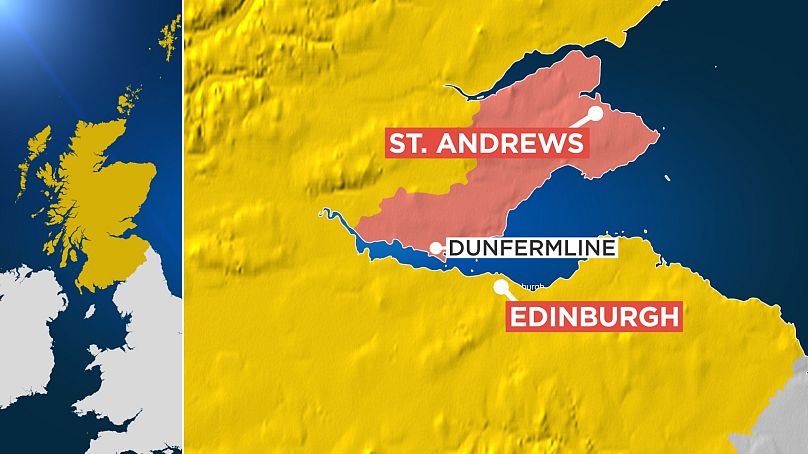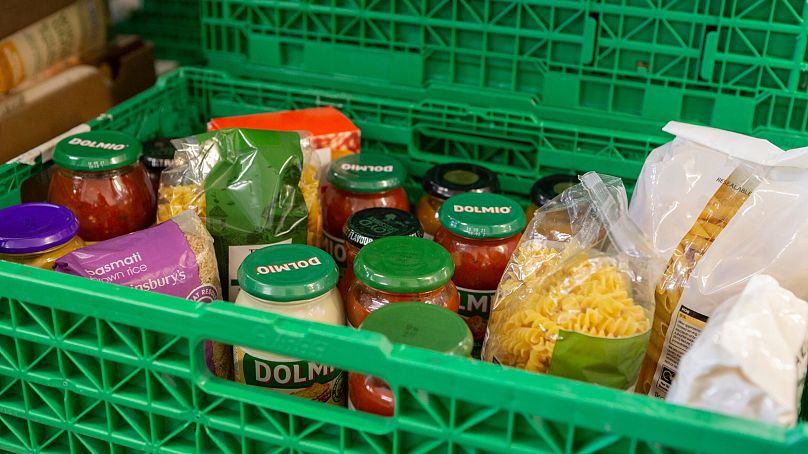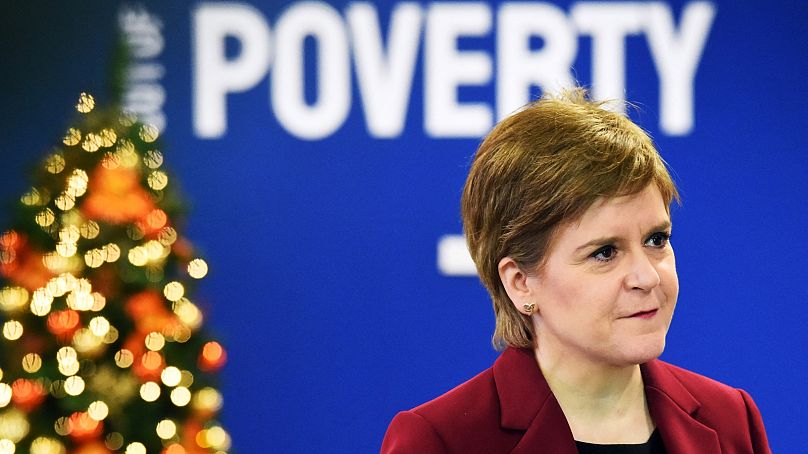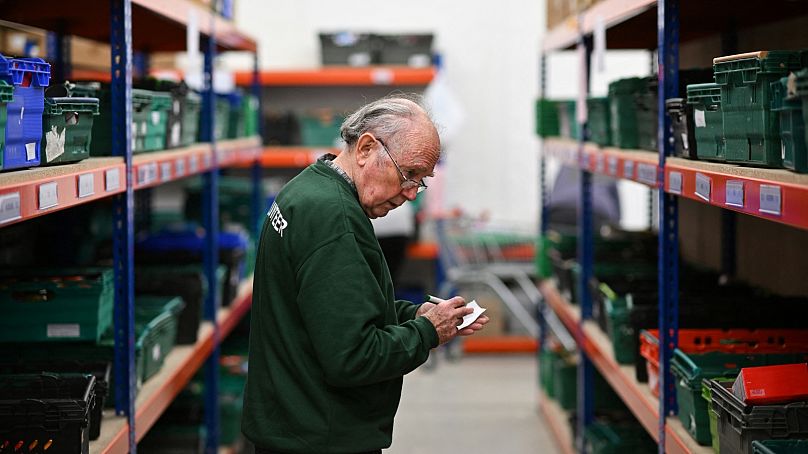The Scottish Government blames London for the cost of living crisis, but charities say Nicola Sturgeon's administration could be doing much more to help.
The sheer volume of people showing up at food banks in Scotland ahead of the Christmas holidays has left charity workers deeply concerned as the damaging impacts of cold winter weather, sky-high utility prices and the cost of living crisis converge.
 ADVERTISEMENT
ADVERTISEMENT
 ADVERTISEMENT
ADVERTISEMENT
The eastern region of Fife, with a population of around 370,000 people, is a microcosm for the rest of the country. The newly-minted city of Dunfermline sits alongside an agricultural heartland; while run-down villages betray the legacy of coal mining's demise. A string of well-to-do small towns along the southern coast -- with views over the Firth of Forth towards Edinburgh -- stand in contrast to high streets once bustling, now blighted by empty shop fronts.
And while some of Europe's elite have rubbed shoulders with royalty as students at St. Andrew's University -- the same seaside town where rich tourists shell out thousands to stay and play a round of golf at the Old Course -- just a short drive away are pockets of Fife where socio-economic disadvantage is a multi-generational problem.
Fife is the sort of place where some towns have average house prices above half a million pounds (€645,000) while others have the highest rates of teenage pregnancies in some of Scotland's most deprived communities.
Like many issues in Scotland though, poverty has become political.
Nicola Sturgeon's ruling Scottish National Party lays the blame for the cost of living crisis squarely at the door of the Conservative government in London; but people on the front line of the fight against poverty say while this may be true, the Scottish government could and should be doing a lot more with the powers it has to alleviate poverty.
The food bank experience
Trussell Trust runs four food banks in Fife, and in the week beginning 12 December, they saw a 25% increase in the number of people coming for help.
There's no average user for people who finds themselves in an emergency situation, explained Michael Calder, the Trussell Trust area manager for Fife, and added that coming to a food bank "is not something people celebrate".
"There is such a diverse clientele and often people you wouldn't expect coming through your doors. There are some overarching themes in terms of people that would come to a food bank but there is a misconception that it's only people on social security. The majority, yes, which really highlights how poorly designed our social security sector is in the UK," he told Euronews.
The trust's own figures show that one-in-five people who come to food banks are working, which indicates that having a job is not in itself the answer to poverty alleviation.
"That's why we're campaigning for social security that provides a safety net, and for work that pays well -- not just to afford the basics but to live comfortably. It's about job security, flexible working, adequate contracts," said Calder.
People who use one of Trussell Trust's network of food banks will usually be limited to three visits in six months, and get a parcel with enough emergency supplies to last them for three days. Those parcels usually contain non-perishable items but sometimes they're topped up with fruit and vegetables, milk, or bread and items donated by supermarkets.
"There is an added burden and pressure to spend at Christmas, but what is much more evident in December time is when the temperature starts to drop that you really have to put your heating on and that is something we are beginning to see now. Obviously, the cost of living crisis has impacted globally, not just on Scotland, but this is the busiest year we have had on record at the Trussell Trust," said Calder.
The "scariest thing," he explained, is that his figures are the tip of the iceberg. They're just one charity running a network of food banks. Other charities keep their own data, and people who use social supermarkets, take a hot meal at a local church or Salvation Army centre, or visit a community pantry for help might never be recorded in statistics.
Two groups cause charity workers particular concern: young people aged 16-24 in Fife, and across Scotland, who represent a small amount of those who get a food parcel, but who experience higher rates of food insecurity suggesting they're not getting help and simply going hungry. Single people who live alone, and have nobody to help them share the burden of food costs, or gas and electricity bills, are also becoming more vulnerable.
"Fife is no different than national trends. Comparing April to September last year to this year we saw a 32% increase in the number of food parcels given out overall, a 35% increase in the number of parcels that went to children, and in the last six months a 46% increase in families using food banks for the first time," said Trussell Trust's Michael Calder, reeling off the grim statistics that highlight the lived experiences of poverty in Scotland.
The politics of poverty
From the perspective of the Scottish government, there's no doubt who is responsible for the cost of living crisis and increased reliance on food banks.
They've even branded it "the Tory cost of living crisis" for good measure.
"Foodbank use has risen dramatically since the Tories came to power in 2010. Whilst the SNP Scottish Government has been doing what it can with its limited powers to tackle poverty and inequality, Westminster policies continue to undermine our hard work," SNP MP Chris Stephens said recently.
"It is only with the full powers of independence that Scotland stands a chance of eradicating foodbank use for good."
Charities say that's only part of the story, and that the Scottish government already has it within its power to help the country's most vulnerable people and lift them out of poverty.
"There's no such thing as 'food poverty', there's just poverty, and not being able to afford food is a manifestation of that," explained Neil Cowan, interviewed as Manager of Campaigns & Policy at the Poverty Alliance.
"It is true the Scottish Government don't have all the powers at their disposal to tackle poverty. They don't have full control of social security like universal credit. They don't have full power over labour markets like setting the minimum wage," he told Euronews.
"But it's equally true that the Scottish Government could do much more with the powers they do have like free school meals, and they have huge powers over public services like transport, housing, child care. These are areas where bigger interventions can be made.
"They could expand free bus travel to people on low incomes, they could do more to regulate housing costs. They could also expand free childcare provisions and that would help women back into the labour market," said Cowan.
Michael Calder from the Trussell Truss agrees with that assessment too: "The Scottish Government do have enough levers at their disposal to make pro-poverty proposals that would see people have less need for reliance on food banks," he said.
Different options for helping people in crisis
North and south of the border, the governments have been offering assistance. Among a number of different initiatives, the UK Government has given lump sums to help cover rising electricity bills, although the money has to be paid back in the longer term; while the stand-out policy from the Scottish Government has been to increase a child payment provision so that families on universal credit benefits now get £25 (€28.6) each week for every child under 16 -- something that is not available to families in other parts of the UK.
In Fife, the local council earmarked an additional £10 million (€11.6m) to help tackle poverty in the region during the autumn, with other funds designed to tackle specific problems.
“The council has an agreed programme of support for people facing the impacts of poverty and the cost of living crisis including an additional investment of £5.3m to support low-income families and stimulate local economic recovery," said David Ross, leader of Fife Council.
"This is on top of the more than £11m that the council already commits directly to tackling poverty," he added.
The council's latest initiative is called "Warm Spaces" where people can go to libraries, leisure centres or other community facilities and stay warm, get a hot drink and charge their devices if the cost of heating their own homes is prohibitive. It's the sort of scheme that's already up and running for residents of the Ukrainian capital Kyiv after weeks of sustained Russian bombardment, now also a reality of daily life in Scotland.
"Don't struggle alone this winter," said Fife Council leader Dave Ross. "Get help."














